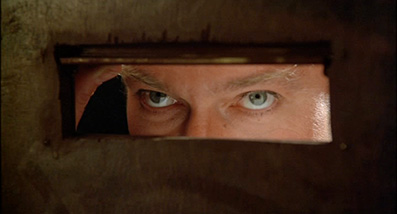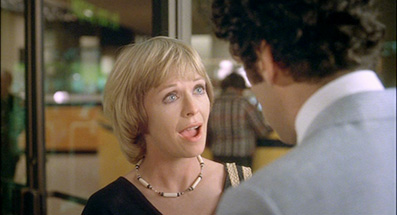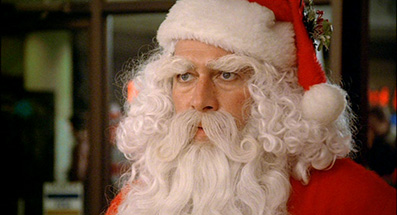|
If the hook of a thriller lies in its premise, try this for starters. Meek teller Miles Cullen works at a small bank located in a Toronto shopping mall. With Christmas approaching, business is brisk, and at closing time one day Miles discovers a surreptitiously written note announcing that its author has a gun and is demanding that the document's receiver hand over all of the cash in their till. The following day, Miles spots the note's distinctive lettering on a sign being displayed by a mall Santa Claus, and realises that this is the man who intends to attempt the robbery. But instead of alerting the authorities he formulates a plan, and when the robber shows up at his desk as expected, Miles hands over some of the money but keeps the lion's share for himself. What he doesn't realise is that the robber is Harry Reikle, and Harry Reikle is no ordinary thief but a vindictive sadist who doesn't take kindly to being cheated out of his spoils, and a potentially deadly cat and mouse game between the two men begins.
It's a neat set up, seductively developed, with economical character introductions ensuring that even though the plot kicks off in the first couple of minutes, by the time it starts to really impact on Miles we've got to know him well enough to be concerned for his wellbeing. Full marks here to a smartly structured and thoughtfully developed screenplay by Curtis Hanson, who would later score gold as writer and director of The Hand That Rocks the Cradle and L.A. Confidential. He clearly knows how to devise scenes of nail chewing tension, but also understands the importance of letting the audience get to know the people we are being asked to care for first and of weaving this into the thread of the plot. Thus, when Miles discovers the note that first triggers his adventures, it's not mixed up with other papers, but on the copy sheet of a carbonated customer withdrawal slip, on which he is drawing pictograms as a way of tentatively asking his self-confident and attractive colleague Julie out for a drink. We learn quite a bit in these opening few minutes: that Miles has a thing for Julie; that Julie likes Miles, but probably not enough to date him; that Miles is easily put upon by his brash boss Charles Packard; and that Packard is happily married but is seeing Julie on the side. We soon discover that Miles lives alone in a compact apartment, passes his spare time solving chess problems, and keeps tropical fish, about which he is passionate. This is not someone naturally disposed to criminal activity, but a man who is dissatisfied with his lot in life. In a moment that really should feel overstated but curiously doesn't, he angrily knocks his chess pieces from the board (the incident that triggers this is nicely handled) and in the process of replacing them pauses to take a long hard look at a pawn, and in this moment you can see the cogs turning. Even before he first comes face to face with Reikle for the first time, we know enough about Miles and his life frustrations to understand his motivation for pulling the money switch.

Casting is crucial here. I'll confess that I've never been completely sure about Elliot Gould. We all loved him in M*A*S*H, and I enjoyed him immensely as an alternative Philip Marlowe in Altman's take on The Long Goodbye. Yet while almost always likeable, he rarely seemed to land roles that suited his offbeat talents and on-screen persona, and could sometimes come across as something of an emotional blank slate. But there are two not so widely known films in which I have always thought that he was perfectly cast. The first is Alan Arkin's excellent but rarely screened Little Murders (1971), in which a lack of emotional expression was crucial to his character, a man who has been rendered unable to react to even extreme situations by modern city life. The second is Miles Cullen in The Silent Partner, where Gould's slightly nerdy appearance and reluctance to openly express his emotions are what make the character so sympathetic, and his post robbery increase in confidence so intriguing.
If Gould is cast perfectly to type, then kicking against expectations is gentlemanly master of the stage Christopher Plummer, who as the sadistic and almost androgynous Harry Reikle makes for an icily threatening villain, one dangerous, fixated and unpredictable enough to have you on edge every time he puts in an appearance. Plummer can suggest the most appalling consequences of crossing him with little more than a menacing stare, and when he warns Elliot not to put down the phone "or I might have to come up there, and I don't want to do that yet" (and oh boy does the word "yet" hang menacingly in the air), you genuinely fear for the consequences of what this might mean. With damned good reason, as it turns out.
Completing the threesome of impeccably cast leads is Susannah York, who creates in Julie a character who is always much more than Elliot's object of desire, a strong-willed woman in search of something she's not yet found, and whose attraction to Elliot is tempered by his lack of self-confidence and often erratic behaviour towards her. Her expressed confusion at actions she is unaware of the true cause of is impressively authentic, the responses of a genuinely bemused and frustrated woman rather than an actress asked to express these feelings. It helps that her part is so solidly written, a rare strong female role in a genre where women too often tend to be included as accessories or afterthoughts.

It's this focus on the characters and their grounding in reality that allows Hanson and director Daryl Duke (who worked mainly in TV but on the evidence here really should have had handled more feature films) to periodically put the tension on hold without letting the drama lull. Even Miles' potentially plot-stalling romance with attractive French nurse Elaine (alluringly played by French Canadian actress Céline Lomez) proves to have purpose beyond its more obvious function as dramatic breathing space. I shall say no more.
But as you would expect from a thriller worth its salt, the meat of the film lies in the battle of wits between Miles and Reikle, one kicked off when Reikle telephones Miles at the worst possible time and delivers the line that titles both this review and the 1968 novel by Danish writer Anders Bodelsen on which it is based.* Reikle is established as a credible threat from an early stage when he violently assaults a girl at a gym and shows neither a flicker of remorse nor concern at the prospect of being arrested for the crime. But while the odds are stacked against Miles from the moment the conflict with Reikle is initiated, he is credited from an early stage with the sort of smarts and determination that are needed to at least give him a fighting chance of outwitting his foe. Yet the tension is maintained by ensuring that every time he gains even the smallest advantage, the threat level is increased, to a degree that prompted some contemporary reviewers to complain that one act of violence in particular was excessive and gratuitous. Without wanting to give anything crucial away, I would argue the opposite, and suggest that at this point in the story such a scene is required to push the conflict to the point where there is no going back for either participant. It is, however, worth keeping this scene in mind when you consider how we are asked to respond to the ending...
Watching The Silent Partner after a gap of several years, I was seriously impressed by how well it still stands up. The t-shirt slogans worn by flirty new employee Louise and the support role casting of then newcomer John Candy aside, there's little here to seriously date the film to its time and place. It's smartly made and structured and consistently gripping crime thriller with neatly timed twists and well-drawn characters, and like so many fondly recalled examples of North American cinema from the 1970s, it leaves you quietly aching for a time when such films were more the rule than the striking exception.

Which brings me to the question of why one of the smartest and most satisfying caper thrillers of the late 1970s – one that won Best Film at the 1978 Canadian Film Awards no less – has never been released on UK DVD. This has proved particularly frustrating over the years for those of us who caught it on its cinema release and were keen to see it again. Making matters worse is that when it was first shown on UK TV, the use of what I'll coyly refer to as stronger language was cut, which had the effect of completely removing a key turning point for the plot.** The DVD under examination here was released back in 2007 in the US by Lionsgate, but if you did know the film and caught a look at the cover artwork you'd think you'd stumbled on a retitled sequel to Reservoir Dogs instead. Seriously, what the hell is that principal cover image about? It's not from the film – hell, you'd be pushed to say it was even inspired by the film. That said, for sheer peculiarity you'd have to go some way to beat Marek Ploza-Dolinski's bizarre but somehow fascinating Polish film poster, which you can see here.
It doesn't start well. The 1.85:1 anamorphic transfer, though largely clean of dust and free of instability, is downright soft and has the sort of colour grading that suggests whoever was in charge of the process has a fondness for green. At first, I suspected that this would be confined to the opening titles (if you're mastering from the negative – and I'm not saying this was – then you either have to re-composite any superimposed titles or source those sequences from a projection print), but nope, it was still this way for some time after the main credits had concluded. Then, after about ten minutes or so, the image quality improves, gradually enough for me not to notice at first but eventually to a level that prompted me to remark on it to my viewing companion, who had also noticed the shift. From then on the general picture quality is substantially better – there is still some unevenness in the sharpness and colour timing, but intermittently there are shots whose contrast, colour and detail border on excellent.

The Dolby 2.0 mono soundtrack is a largely functional affair with an unsurprisingly limited dynamic range. The dialogue is generally clear, but there are a couple of occasions where it is drowned out by the louder elements of jazz giant Oscar Peterson's score. I can't believe this was ever intended (I certainly don't remember this from the cinema screening), suggesting that something has gone a little awry in the sound mix for the DVD.
Not a thing. I'll thus take the opportunity to state that the DVD case is made from the thinnest plastic you could probably construct such a receptacle from without it dissolving in your hands when you opened it.
A personal favourite from 1978 that has stood the test of time handsomely, thanks in no small part of Curtis Hanson's smart script, Daryl Duke's tight direction, well defined characters, and a trio of fine lead performances. It's still not available on UK DVD, and the Lionsgate one under examination here is region 1 encoded and has been out long enough now for me to be concerned for its future availability. But if you are looking to grab a copy then it's currently dirt cheap on Amazon – I've not been able to find it on other UK based disc retail sites as yet. The disc is some way from perfect, but the film itself still comes recommended.
* This is actually the second film adaptation of Bodelsen's novel. The first was a Danish version written and directed by Palle Kjærulff-Schmidt and released in 1969 with the same title as the novel, Tænk på et tal [Think of a Number]. From what I can gather, it has been little seen outside of its home country.
** I'm obviously not going to reveal what the plot point in question was here, but for those who've seen the film it's a three word proclamation made by Miles from a public pay phone. You'll know the one.
|